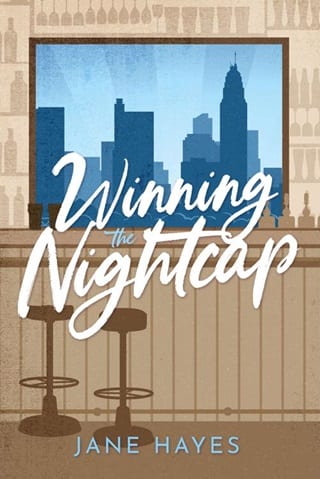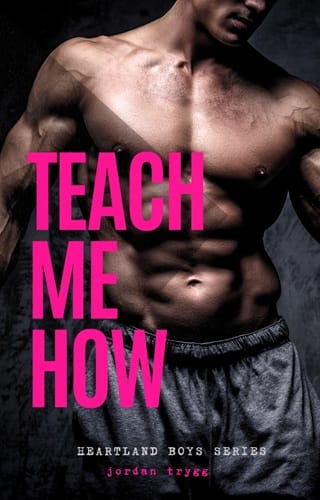Chapter Two
Callie
Gray Aldridge is tall and muscular. His thick arms fill out his pale blue short sleeve shirt. The undone top two buttons tempt me to know how muscular the rest of him is. His dark brown eyes seem serious even as the edge of his lip twitches like he’s trying to hold back a smile. I wonder what he’s thinking, what’s making him smile—no, consider smiling. Or maybe that’s just his natural expression.
At least, this time, I don’t detect anything ‘off’ like with that stockbroker jerk. My instincts at the time were screaming at me. I should’ve listened, but I needed the cash, and the darkness started slowly. Gray doesn’t seem like a perv and there’s nothing inappropriate in his demeanor.
Heck, though, if he was… No, I won’t think about that. I won’t imagine touching his thick arm, feeling my fingernails bend against his unyielding muscles. I won’t imagine throwing my arms around his broad shoulders or dragging my hands through his silver hair, glinting in the sunlight. I’m achingly aware of the beads of sweat dripping down my neck toward my chest. But his eyes don’t follow them.
“The agency has given me your answers to all the standard questions,” he says in a deep, sophisticated voice. “You’re clearly capable of keeping a child on track. Your previous client has twins, I believe.”
“Yes, Mr…” I clear my throat. “Gray.” This is going to take some getting used to. The stockbroker jerk wanted me to call him sir—he actually got off on it. But beggars can’t be choosers. “They were very rambunctious, bouncing off the walls. It was quite the challenge to think of ways to keep them occupied.”
“How did you do that?”
“I invented games,” I tell him. “For example, once, they tried to challenge me by bouncing up and down on their parents’ bed. That wasn’t allowed. So I took them to the park and told them to see who could jump up and down the most times. By the time we got home, they were exhausted.”
His lip twitches again, and he efficiently types something on his phone. Keeping notes, I guess. I shift in my seat and then take a sip of my iced tea. I wouldn’t have said I got nervous during interviews before meeting Gray. “But what if you couldn’t take time to do something like that, but they were still behaving hyperactively?”
“There’s a time and a place for every style,” I say. My voice falters briefly, but I force myself to speak more steadily. There’s something about the way he’s looking at me that throws me off my game. But it’s not weird. It’s not creepy. It’s just him. “I prefer to take a more creative approach. If I had to be stern with the twins, I would. But that was rare. Once I developed a relationship with them and they respected me, I could mostly have conversations with them. Convince them to control their behavior rather than force them to.”
“How would you do that?”
“For example, once, my employer asked me to bring them to a speech he was giving. They did not want to go.” I smile at the memory, but it’s tarnished by how the stockbroker ogled me from the podium. My skin crawls just thinking about it now. “So I explained to them that this was important to their daddy. I had a long conversation with them. I had to go over it several times, but eventually, they understood. The boys were very motivated by challenges, so if I could turn it into a game, that would always help.”
“It must’ve been hard leaving them,” Gray says.
“It was,” I admit. “But I never forgot that I was there for a specific role. There are two big mistakes nannies make—caring too much and not caring enough.”
His lip twitches into an almost-smile. A tingle dances down my spine and to my core. I squeeze my legs together under the table. What the heck is wrong with me? I hope none of this shows. It’s just his gaze, his arms, the swells of his chest, the attention. He’s hot, mature—Shut up, brain.
“My property is under surveillance,” he says. “Inside and out. Since I will be leaving my daughter with you, I’m sure you can understand that.”
“Of course,” I tell him. “She’s your baby. I wouldn’t expect anything less.”
“I have access to the cameras in real-time, and the footage is recorded on a server with almost infinite bandwidth. I don’t delete old footage. All my cameras have audio, too. This may seem paranoid—”
“It doesn’t,” I tell him honestly.
“My previous nanny was stifling my daughter’s creativity. I only learned about that because of my surveillance. The cameras have lights on them, though, Callie. When I’m actively watching them, they glow red. I think it’s fair for you to know this just in case…”
He trails off. Again, my skin sizzles. Just in case I’m getting changed. Just in case I’m in a bikini and using the pool, and you’re watching me, and my body is covered in water, and I imagine you wanting me as badly as I want— Oh, God. I really need to stop.
“I get it,” I say. “That’s completely fine.”
“Do you read?” he asks.
I nod.
“What sort of books?”
“All sorts,” I say, not wanting to admit the truth.
“What genres do you read most often?”
Could I lie? Why don’t I want to tell him? If I lie, though, he might ask me specific questions. “Romance,” I murmur.
His eyes widen slightly. I don’t have to tell him they’re steamy romances. I don’t have to tell him that. Sitting here, I almost feel like we’re in one of those stories now. I don’t have to tell him that, before I met him, I could never imagine the faces of the romance heroes, even if the author described them. But now, they have his face. They’re all Gray.
“Ah,” he says. “Why romance?”
How the fuck is this relevant? I almost snap. But that would be a mistake.
“They’re a break from everyday life,” I say, shrugging, hoping he doesn’t make the obvious point that all fiction fits that description. “I guess they give me a perfect version of reality, too. But I like classics, too. And crime. I’ll read anything.”
“Emery reads a lot,” he says with evident fatherly pride. “She devours books. That’s why I asked. Maybe keep her away from romances, though,” he chuckles.
Okay, he’s laughing. Any awkwardness I imagined was probably in my head. I have to remember that this is one-sided. I’m the one looking at his corded arms, and my mind is trying to tug me to silly places. He’s not thinking about me that way or losing his head.
“I’ll encourage her,” I tell him. “I’ll take her to the library or the bookstore and help her discover her own relationship to books rather than forcing one on her. I believe all kids should have that, Mr., er Gray .”
Before he can reply, footsteps pitter-patter around the corner. I turn to see a girl with boundless energy, her eyes wide and bright, her hair black and slightly messy in an adorable way. “Oh, hello!” she says socially, sounding very precocious for a seven-year-old.
“Hello,” I say, smiling.
Gray says nothing. I’m not looking at him, but I can imagine him sitting back, taking in this moment. Is this the real interview?
“What’s your name?” the girl asks.
“Callie,” I tell her. “And yours?”
“Emery.”
“Can you spell it?”
She grins, seeming delighted. “Uh, yeah . It’s E-M-E-R-Y. Can you spell your name?”
I laugh. “Yes, it’s S-I-L-L-Y.”
She narrows her eyes, then giggles in the most adorable way. “No, that’s wrong! That’s ‘silly’!”
“Oh, silly me,” I say, and she laughs again. “Why don’t you spell it for me?”
“I can try.”
“I bet you’ll do great.”
She walks closer, full of that wonderful enthusiasm. There’s something so beautiful about seeing the world through the innocence and eagerness of a child. “C-A-L-L…Y?”
“Close,” I tell her. “ Very close.”
“Wait.” She shifts from foot to foot. “C-A-L-L-I- E .”
“Yes! Well done.”
“Yippee.” She throws her hands up. “That’s really cool. Spelling is fun.”
My heart fills with warmth. The fact she can say something like spelling is fun without self-consciousness or cynicism means her upbringing has been very different from mine. If I’d said something like that, the kids at my school would’ve bullied me relentlessly for it.
“Why are you talking to my daddy?” she asks.
I glance at Gray, unsure how much he wants me to tell her. He’s got his chin resting on his closed fist like the famous statue, The Thinker. His dark eyes appraise me this time. He seems to be looking deeply inside of me—no, that’s romance-book stuff. That’s stuff I need to get out of my head. He gives a slight nod.
Turning back to Emery, I say, “I’m interviewing with your daddy to be your new nanny, Emery.”
“My old nanny was a witch,” she says, some of the brightness draining from her eyes. I wish I could find the woman capable of dimming this girl’s light and make her pay. “I said I was going to write a story about a walrus who could fly, and she said walruses can’t fly, and I had to write a boring story about a girl working at a bakery instead.”
“Why?” I ask.
“She said a girl should live in the real world. But I already do live in the real world. She thought I didn’t know that books and all this are different.” When she gestures at the garden, at reality, I get an image of her in a college lecture hall one day, leading a class. “Isn’t that funny?”
No. It’s sad. But I won’t tell her that. I won’t tell her that one of the reasons I became a nanny is because I’m all too familiar with grownups wanting to constrain kids, thinking they have the right to dictate to them, lock them in metaphorical cages, and control everything they do. “Did you write the walrus story?”
“Yeah!” She beams. “Do you want to read it, C-A-L-L-I-E?”
I glance at Gray again. This time, he’s not trying to hide his smile. His dark eyes glint, brightening up. Something other than this inappropriate-as-hell desire spikes in me. It’s a warm swelling, almost like I’m experiencing what I warned against—caring too much. As he looks at me, for a surreal moment, it’s like we’re a family. But it’s just because Emery is such a lovely little girl. She’s what makes the moment unique. He nods again.
“Sure,” I say. “That would be great.”
“Yippee!” She leans forward and grabs my hand, leading me into their house. Their home is huge , all gray brick, almost like a castle. I walk through wide, tall hallways covered in modern art, then turn a corner into a grand, two-story library. I pause, looking around in awe at all the books and the light coming in through the large windows.
“This is a magic library,” Emery says, seeing me looking. “You walk in and feel happy, and that never changes.”
“It’s amazing, Emery,” I tell her. “Thank you for letting me share it with you.”
“You are welcome, C-A-L-L-I-E!”
 Fullepub
Fullepub 



